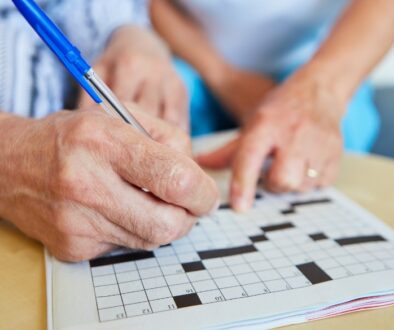Memory Fitness Plan: When A Loved One Has Dementia
A memory fitness plan for successful aging includes maintaining a positive attitude, paying attention, healthier lifestyle choices, effective memory props, upgrading brain games and creating balance in daily routines. When a person has Alzheimer’s disease or a related dementia, these strategies are still important, particularly in the earlier stages.
First of all, a person with dementia may have lost the ability to initiate and organize. When some of my patients’ families describe their loved one, frequent comments include words like laziness and lack of interest. What I have repeatedly discovered is that, with family and caregiver education, there can be a significant change in their interactions. After assessing the strengths of the person with dementia, the next step is to provide insights and recommendations to all involved for a revised memory fitness plan.
Basically, if someone assists or works with the person by providing appropriate cues, participation often increases. For example, the person with dementia may no longer be able to plan balanced meals, but can help in the meal preparation with assistance. A person may not continue an exercise plan unless someone else provides the lead or organizes the opportunity. In some cases, the best approach is to guide the person step-by-step because anything more than that is information overload and discourages participation.
This same approach can be very effective with activities that will help keep a person involved during the day. When I see a situation where a client basically sits in front of the television, often sleeping, I am determined to see what can be done to address what is “”not”” happening. Just recently one gentleman, in his 90’s, agreed he slept so much during the day because he was bored.
My goal is to help families and caregivers create and support activities at the appropriate level for the person who no longer does the things that were once part of leisure time interests. Whether it was reading, doing puzzles or word games, talking on the phone or participating in conversations, sometimes modifications can be made to facilitate some level of participation. This gentleman and his wife were very responsive to some new ideas and the next session or two will be focused on creating a personalized memory fitness plan. With his interest in word games, it will be easy to find some things he might enjoy. It is important to make them less challenging but fun for both of them.
Here are just a few ideas for those with mild memory/impairments. Sometimes it takes continued modifications along the way but seeing increased engagement often keeps family and caregivers motivated to try new options:
People who used to read novels often just stop doing that. It is usually harder to retain information or follow complicated plots. One of my clients kept reading her favorite books over and over again. Another client still tried to read novels on the best seller list. She enjoyed them but, in a follow-up discussion, it was apparent that she missed much of the intricate plot. In cases like this, I am just pleased to see that each person has found a way to stay engaged. I don’t know about you but I love to read and I would miss being able to do that. When there are more cognitive, visual or short term memory deficits, a person usually stops reading or just glances at the large print headlines in the newspaper.
Options that have been successful include caregivers finding large print versions of books for those with visual difficulties. When I recommend books with shorter stories that are inspirational or humorous, some people are able to start reading again. One wife now reads the shorter stories to her husband. He could not tell you what she said after she was finished but he laughed or commented appropriately during the reading so it was a positive experience for both. One of the daughters from out-of-state decided to record some of the stories and her mom enjoyed listening to them as well. One of the grandchildren was learning to read so some stories were taped as well for the grandparents’ enjoyment. Another family got books on CD that their dad used to read and he listens to them for short periods of time with the privately hired caregiver since electronic devices are something he can no longer manage.
Puzzles and word games are much easier to modify. Sometime it helps to make a copy of the puzzle, enlarging the print. One family makes a duplicate copy, fills in some of the letters to help their dad, and they work on the puzzle together. One granddaughter comes over after school once a week, and does the puzzles with her grandmother. When her dad was unable to do crossword puzzles anymore because of a tremor, my colleague would let him give her the answer and she wrote them in. Interestingly, she never did crossword puzzles before but has actually added that to her brain fitness routine.
When I went home to visit my mom, we played lots of Scrabble. As her memory and cognition changed, coming up with words were more of a challenge so she created a cheat sheet of uncommon but acceptable two and three letter words. That way when she was stuck, she used that list. What mattered was helping her do what she loved, at the level that worked for her at the time.
Some families notice the loved one with dementia may have less interest in movies or television programs. If there is a hearing loss, certainly that can be part of the issue and looking into an appropriate listening device may be beneficial for many reasons. If a person enjoyed programs with complicated plots, families eventually notice a change in interests. These stories move fast and conversations are not always easy to understand even for the person with a mild hearing problem. One family decided to rent favorite movies and often found watching them twice worked well. Others will find the closed-captioned option helpful. This may be the time to explore older movies or to find some of the television programs from decades ago to watch. Remember that these great ideas often work, but only if someone else can take care of the details.
One daughter would call her parents the night before and let them know the time and station of a certain movie. Another family made arrangements for programs to be recorded and watched when the caregiver was there to set them up. New technology can often be confusing for someone with mild dementia, so the reason for lack of participation may be the difficulty in organizing all the steps. One family picked movies that their parents would enjoy and now they get them at home through a monthly subscription service.
There are no perfect solutions only special moments. It is not so important that we always succeed in these attempts. Those who are most successful do they best they can, gathering information along the way, with the intent of just being together along the journey, sharing time and memories. For additional information refer to the Creating Time Well Spent: Enhancing Your Visits with an Older Adult
“”Too often we underestimate the power of a touch, a smile, a kind word, a listening ear, an honest compliment, or the smallest act of caring, all of which have the potential to turn a life around.”” Leo F. Buscaglia
Source: eldercarelink.com




